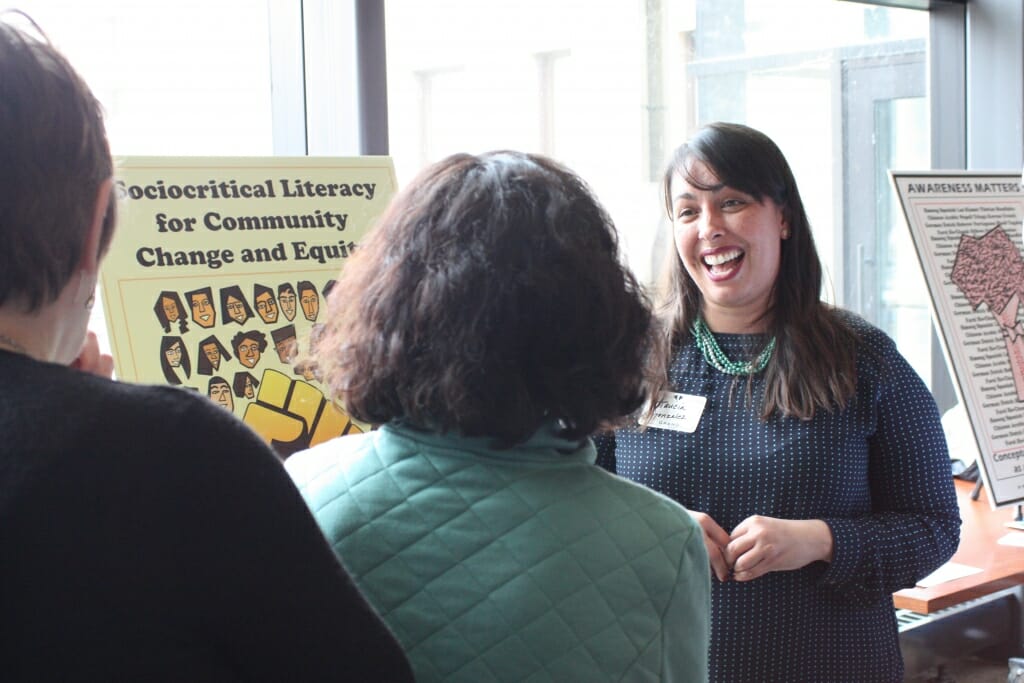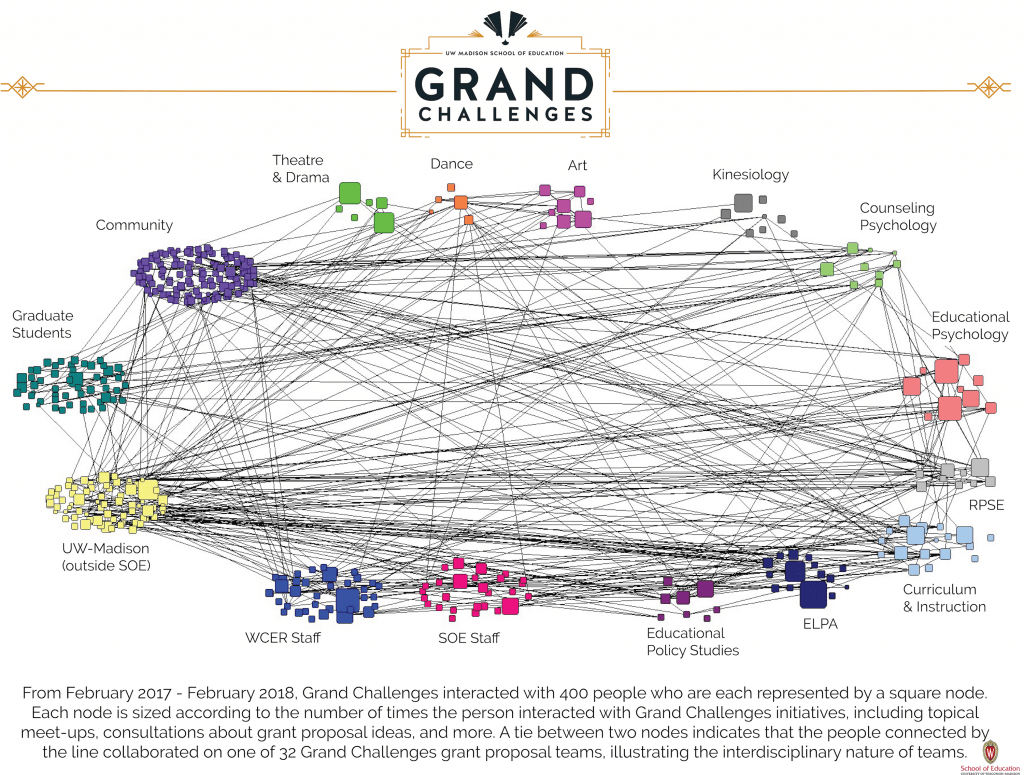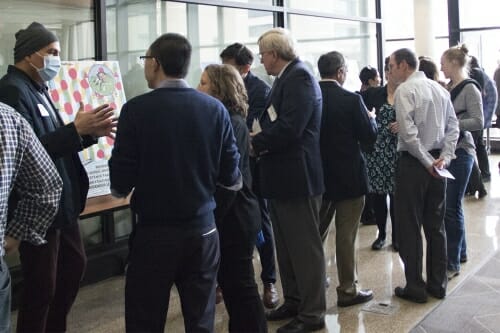Grand Challenge Transform grants supporting interdisciplinary projects designed to back youth and families in Wisconsin

Taucia Gonzalez, an assistant professor with the Department of Rehabilitation Psychology and Special Education, discusses her team’s proposal on “Sociocritical Literacy for Community Change and Equity,” during a Transform grant poster fair on Feb. 28. Submitted photo
The Grand Challenges initiative developed in UW–Madison’s School of Education, which aims to ignite cross-disciplinary innovation, is awarding grants to four projects that display the potential to transform lives by supporting young people and families in Wisconsin.
These aptly named “Transform” grants are worth up to $250,000 each and are backing an impressive set of proposals, including one that’s designed to advance mental health for children in rural Wisconsin and another to mobilize and amplify youth voices for racial justice in Dane County.
The School of Education is home to a unique and diverse set of 10 departments spanning the arts, education and health. Grand Challenges was launched in February 2017 to spark innovation by supporting new teams of faculty and staff across departments, around the university and with partners off campus.
“I am so excited about how the Grand Challenges initiative has provided support for our faculty and staff to work in collaboration with community organizations and others from across UW–Madison to develop new interdisciplinary teams,” says School of Education Dean Diana Hess. “These teams have created exciting projects and ways to do high quality research on them that will have real impact on the lives of people across Wisconsin.”
 Eighteen Transform proposals were submitted, with teams representing nine departments across the School of Education and 96 people in all – including 21 from other UW–Madison schools and colleges, and 12 from the broader community. The four projects awarded Transform funding are:
Eighteen Transform proposals were submitted, with teams representing nine departments across the School of Education and 96 people in all – including 21 from other UW–Madison schools and colleges, and 12 from the broader community. The four projects awarded Transform funding are:
- FOCUS Partnerships: Enhancing Mental and Behavioral Health for Children and Youth in Rural Wisconsin Communities
Team: Craig Albers and Andy Garbacz (Department of Educational Psychology); Bonnie Doren, Melinda Leko and Andrea Ruppar (Department of Rehabilitation Psychology and Special Education); Steve Small (School of Human Ecology), Carmen Valdez (Department of Counseling Psychology); Eric Grodsky (Department of Educational Policy Studies); and Amy Meinen (the healthTIDE network)
Overview: Families, Organizations, Community, University and Schools (FOCUS) is a universal mental health promotion program designed to align and integrate evidence-based mental health support in an efficient, effective and sustainable delivery system for rural schools, families and community stakeholders. To address the high needs and low resources in rural communities, this evidence-based approach will provide access and support for mental health interventions with a focus on prevention, promotion and early intervention. Specific activities will likely include building parent, teacher and community stakeholder knowledge, and skills in evidence-based mental health interventions, promoting collaboration across stakeholders and creating professional communities. - Mobilizing Youth Voices for Racial Justice
Team: John Diamond (Department of Educational Leadership and Policy Analysis); Kendra Alexander (School of Human Ecology); Bianca Baldridge (Department of Educational Policy Studies); Erika Bullock (Department of Curriculum and Instruction); Forward Madison/TEEM Scholars; and the POWER Collective
Overview: Mobilizing Youth Voices for Racial Justice is intended to amplify the powerful work youth of color in Madison are doing to advance racial justice in their respective community organizations. This project will engage young people to analyze issues of race and disenfranchisement, develop intergenerational learning and action opportunities, and create a community forum to develop an agenda to implement solutions based on their collective work. Working across three institutional spaces — the Madison Metropolitan School District, UW–Madison and community based organizations — the program aims to build social capital, generate new insights about racial justice and facilitate meaningful progress toward racial justice. - Sociocritical Literacy for Community Change and Equity: Participatory Action Research with Bilingual Hmong and Latino Youth with/out Disabilities
Team: Mariana Pacheco (Department of Curriculum and Instruction); Taucia Gonzalez (Department of Rehabilitation Psychology and Special Education); Yang Sao Xiong (School of Social Work); and Madeline Hafner (Minority Student Achievement Network)
Overview: The Gira Académica para Nuestros Alumnos Sociocríticos (GANAS) program explores how bilingual Latino and Hmong youth with and without disabilities develop sociocritical literacies through participatory action research. Developed with English learner, special education and dual-category students, this program advances equity-driven learning ecologies, promotes students’ meaning making and critical thinking, and advances social change in school districts throughout Wisconsin. GANAS utilizes students’ writing assignments, digital stories, discussion board posts, surveys and interviews to reveal students’ new and shifting perceptions about themselves and their lives. - Building Capacity for Community-School-University Partnerships for Systemic Transformation –– Toward a Culturally Responsive Indigenous Learning Lab
Team: Aydin Bal (Department of Rehabilitation Psychology and Special Education): Aaron Bird Bear (School of Education Student Diversity Programs); and Linda Orie (POSOH Project)
Overview: This project develops a culturally responsive school-wide behavioral support system with Native American students, families, community leaders and educators at a public high school in northern Wisconsin. Use of the Culturally Responsive Positive Behavioral Interventions and Supports (CRPBIS) framework and the Learning Lab methodology are critical to this work. The project will evaluate racial disproportionality in discipline and special education referrals, the use of exclusionary discipline, and perceptions of school climate and environment.
“We are confident that all four of these projects have the capacity to positively impact the lives of youth and their families in Wisconsin,” says Sarah Archibald, associate director of the Wisconsin Collaborative Education Research Network (The Network) within the School of Education, and a Grand Challenges co-director. “The Grand Challenges Transform grant winners embody the spirit of the Wisconsin Idea: They apply university research to address problems beyond campus and improve the quality of life for citizens across the state.”
These uncommon partnerships and innovative projects didn’t come together by accident. After a kickoff event announcing Grand Challenges in February 2017, the initiative’s leadership implemented a social networking strategy to bring talented people together. The team held six informal “meet-ups,” where faculty, staff and community members with similar interests could come together to make new connections. There also were 23 small-group breakfasts and lunches, and seven “spark dinners” that brought together teams with varied sets of expertise to move toward proposals.

eams that submitted proposals for Grand Challenges “Transform” grants presented information about their ideas during a poster fair in the Education Building’s Morgridge Commons on Feb. 28. The posters were created by students from the School of Education’s Art Department. Submitted photo
In September 2017, eight teams competing in the inaugural Grand Challenges “Engage” initiative were selected to receive a combined $200,000 in Engage grants to carry out the Wisconsin Idea on behalf of the School of Education over the next two years. These award winners were selected from 14 proposal teams representing 55 faculty, staff and community members.
The Transform competition, which was designed to attract bigger, better and more complex proposals, was the culmination of one-and-a-half years of relationship building, consultations and mentoring between interested individuals and the Grand Challenges team. From the time of the Grand Challenges launch in February 2017 through February 2018, the initiative made connections between 400 people –- including many graduate students, experts from different corners of the university and community members with no direct ties to the School of Education or UW–Madison.
“Grand Challenges is helping the School of Education unleash the power of its most promising research and programs to transform lives,” says Richard Halverson, a professor of Educational Leadership and Policy Analysis who co-directs The Network and Grand Challenges.
Grand Challenges is made possible thanks to support from UW–Madison’s Office of the Provost, the Wisconsin Center for Education Research and donors.
Learn more at: grandchallenges.education.wisc.edu
